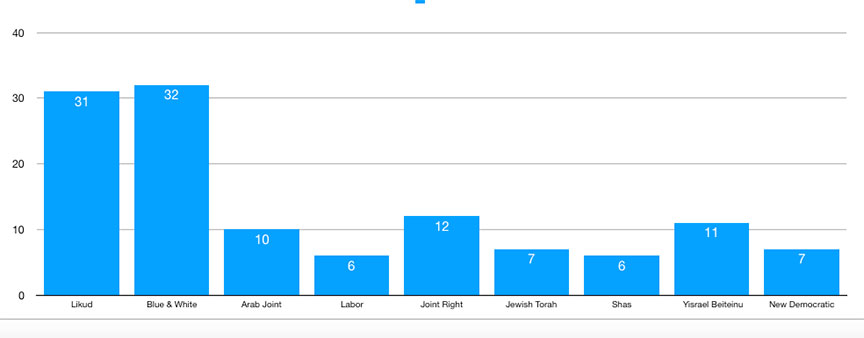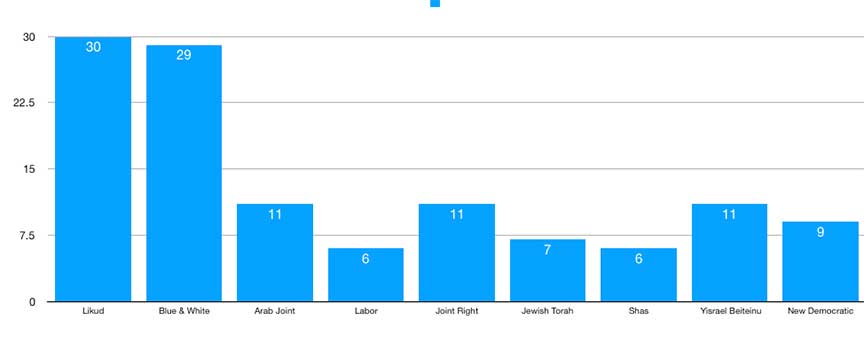
Israeli Elections 2019 Version Two
September 20- The Day After...
On Wednesday morning, Tel Avivians, who voted overwhelmingly for parties that oppose Prime Minister Benjamin Netanyahu, were afraid to open their eyes. They feared a repeat of what has happened many times during the last two decades — i.e. falling asleep believing Prime Minister Netanyahu had been defeated, and waking up to numbers that shifted overnight, marking another Netanyahu victory. However, this time, that did not happen.
As the actual votes were tallied, Tel Aviv denizens learned that the actual tally remained very close to projections from the night before. It was official. Prime Minister Netanyahu had lost. All day Wednesday, and Thursday as the rising percentage of votes slowly rolled in, confirming the loss, Likud supporters continued to try to spin the results, insisting only Netanyahu could form a coalition.
By Friday morning , the numbers were final — Blue and White had received 33 seats and the Likud 31; giving the center-left bloc a mandate of 57 seats, compared to 55 for seats for the right-wing bloc. The remaining 7 seats went to Avigdor Lieberman’s Yisrael Beiteinu party.
The politician, nicknamed by many “The Magician,” (a homage to his political acumen), has now lost two elections — in a row. After the first 2019 election in April, Netanyahu failed to form a government, and promptly called for a new election. Netanyahu did so, in lieu of returning his mandate to assemble a coalition back to the President. The Prime Minister believed many right-wing votes had been wasted, due to parties that did not meet the necessary threshold to enter the Knesset. Moreover, Netanyahu expected that the Likud would do better, now that Finance Minister Moshe Kachlon (whose party received 4 seats in the previous election) had returned to the Likud.
In the last election, Netanyahu’s coalition received 60 seats, without Defense Minister Lieberman’s party. For the aforementioned reasons, coupled with the belief Israeli voters have moved steadily to the right, Netanyahu was convinced he would easily increase his bloc to 61 seats in a do-over, and thus, give him a coalition that would shield him from his legal difficulties. Just to ensure he would win, he devised with a plan to expand what seemed to have work in the last election — i.e. stationing Likud activists with cameras in Arab Israeli polling booths to intimidate them, thereby, suppressing their votes.
Unfortunately for Netanyahu, none of his assumptions proved correct. Things began going wrong when the respected Head of the Election committee informed Netanyahu that bringing cameras into polling places was illegal under current law. Netanyahu then led a campaign to change the law — despite the fact the Knesset had been dispersed, and all legal opinion stated that his proposed “Cameras law” should not be passed under the auspices of a temporary, transitional government. Netanyahu remained adamant and claimed if the bill was not passed, the Arab voters would steal the election.
When the history of this election is written, one fact will be clear — The Netanyahu campaign’s efforts to suppress the Arab Israeli vote had the opposite effect. In this repeat election, Arab Israelis indeed came out in large numbers, and in almost all cases, voted overwhelmingly for parties who oppose Netanyahu — first and foremost, the Joint Arab list.
Netanyahu made another fatal mistake during this campaign. Due to his personal dislike for Naftali Bennett and Ayelet Shaked, he fired them both from their interim ministerial positions, promptly after calling for new the election — despite the fact that Bennett was particularly respected as Education Minister. In place of Bennett, Netanyahu appointed Rabbi Rafi Peretz, the new Bayit HaYehudi religious party.
Peretz immediately started talking about the importance of values and of every 7th and 8th grader visiting the Western Wall. As a result, many average Israelis that want an Education Minister who focuses primarily on math and computer science skills, determined the threat posed by religious parties to the liberal secularism of the country was very real. This played perfectly into the hands of former Defense Minister Lieberman whose campaign was built around ending religious coercion. Instead of being strengthened, the right-wing/religious bloc lost support — having earning 55 seats (a loss of 5 seats from the previous election).
What happened and why it did is relatively clear — though what will happen going forward is less obvious. There is currently no possibility of a far-right/religious coalition being formed. This means there will be new immunity bill passed, nor will there be a bill allowing the Knesset to override the Supreme Court. Netanyahu will have to meet the Attorney General in two weeks and will almost definitely stand trial. The Blue and White Party has made clear they will not enter into a coalition with someone who is about to be (or has been indicted), even though Israeli law allows an indicted Prime Minister to remain in office — a sequence of events that is no longer viable after this election.
Both Blue and White, and Yisrael Beiteinu prefer a national unity government. However, that is only possible without Netanyahu, (who has made it clear he will not go quietly into the night). There are two likely scenarios. Option 1: Netanyahu enters into a plea deal — i.e. he resigns in return for the charges against him being dropped. Most Israelis would support such a deal. No one, even those who dislike Netanyahu wants to see another Israeli PM go through a trial and possibly land in jail. The evidence against Netanyahu appears strong, so for him, this seems like a good exit plan.
Option 2: A revolt takes place inside the Likud. Although Likud ministers all pledged loyalty to Netanyahu shortly before the election, most patiently await the moment he leaves the stage, allowing one of them to replace him. However, for that to happen, it will have to become clear to them that Gantz could form a government without them (either by wooing one of the religious parties, or reaching an agreement with the Arab Joint List to support him from the outside).
There are many other possible scenarios, including a unity government, to which Netanyahu can return, if he is not indicted or proven innocent. However, two results of this election are unambiguous. First, Israel’s electorate did not move further to the right and the forces concerned about the democratic nature of the country did better than expected. Second, the path for Netanyahu to continue now as Prime Minister seems near impossible to navigate, and so the world might soon have to get used to a new Prime Minister of Israel.
Finally, for those the world over, who have been disappointed by the results of elections in their country, time and time again — take heart! Sometimes dreams do not turn into nightmares, and maybe the steady march rightward and towards popularism can be stopped.
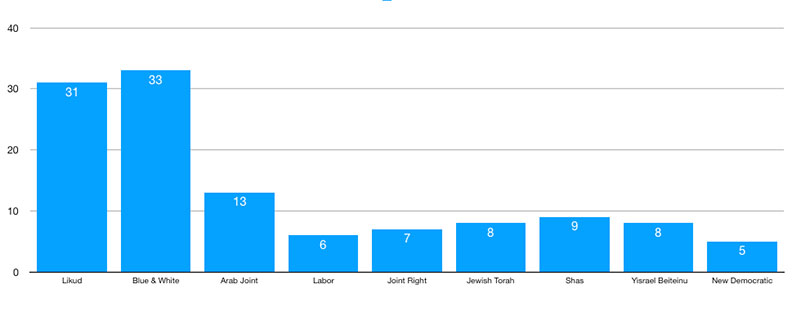
September 9
It’s been a crazy 24 hours in the race toward the Israeli election and events surrounding the campaigns. Last night, in an almost daily leak of testimony by witnesses in the various Netanyahu corruption cases, Israel Channel 13 released testimony given by Miriam Adelson (Sheldon's wife). In that testimony, Adelson claimed that Sara Netanyahu controlled much of what happened, making most decisions for her husband. Miriam Adelson also stated that in her opinion as a physician, Sara was crazy. Adelson continued, in addition to Sara’s yelling and screaming at her, Sara proclaimed that if the Iranians got the bomb, it would be Adelson’s fault, because the newspaper they had founded to help the Netanyahu’s was not doing enough for the first family.
In the morning, the scion of the Begin family, former MK and Likud Minister Benny Begin announced that he could not vote for today's Likud. It was then announced that the Likud's database, containing the personal information of over one million Israelis, had been breached and available for anyone to view — for several days.
Then, came the biggest blow of the day. For the last few days, Netanyahu has been screaming “the Arabs were going to steal the election” and therefore, Likud members must be stationed at the every polling place to take photos of those who vote, and prevent voter fraud. Throughout the evening news broadcasts, every member of the Likud leadership read the script and stated the same message.
Yesterday, despite the objections of the Attorney General, the government passed the “Camera Law” unanimously, and sent it to the Knesset to be voted on in a special session, in a process that bypasses all the normal legislative process. The legal advisor of the Knesset came out against this move, as did the head of the central election committee, along with the President, who does his best not to interfere in partisan politics. It should be noted that no one objected to the idea of cameras installed at voting sites. There are already cameras located in many polling stations, which are overseen by the central election authority. The objections were raised against permitting partisan Likud members to roam around polling stations taking photos.
Once again, it was Avigdor Lieberman who ended the farce by stating he supports the “Camera bill,” as long as the cameras remains under the sole supervision of the central election committee. With Lieberman's opposition, and a member of Kachlon’s party who is not returning to the Knesset choosing to absent himself from the vote, the bill was doomed, and did not make it out of the committee that needed to approve the rapid passage of the bill. During the committee session, we got to witness the wonderful oratory skills of Likud chairman MK Mickey Zohar, who got into an argument with Ahmad Tibi of the Joint Arab List and said to Tibi: “Face it, Jews have special genes — get used to it."
Although the Camera bill did not pass, it should be noted that some believe Bibi achieved his purpose by publicizing the issue of alleged voter fraud and agitating his base — I am not sure I buy that theory. After the defeat he suffered with the “Camera bill,” Netanyahu had to change the public discourse, so he called a press conference to enlighten us and the world revealing new secrets from the Iranian nuclear program. The only problem was that most of what he announced had already been reported the Atomic Energy Commission— although he did show a picture of a site in Abadeh (located south of Isfahan) that Netanyahu claimed was a weapons development center the Iranians destroyed when they found out Israel had discovered it. He then warned the Iranians that we know everything about their program.
It was an election speech and not a very good one at that.
I must say, despite Netanyahu's evident concerns about this election, his supporters remain unconvinced that anyone but Bibi will win. I have spoken to a number Bibi supporters in the last few days, and either they have no idea he is about to be indicted, or assume everyone gets indicted. They seem to think there is no one as good as Bibi and they will keep voting for him.
One correspondent quoting the Torah reference, likened Netanyahu’s cabinet to Abraham’s search for a single Tzadik in Sodom, i.e., no one in his cabinet is willing to say no to Netanyahu — regardless of the demand. Does Netanyahu have enough blind followers? Obviously, his cabinet is made up of them. The ultimate answer to that question will have to wait until next week.
September 1
I have not written an election update in a while, for a simple reason — nothing has been happening. There has been almost no movement in the polls. The only item of interest seems to be the desperation of Prime Minister Netanyahu, who, in Trump-like fashion has been attacking the press, and naming a specific member of the media to be targeted. What did that journalist do? He reported on the testimony provided by Netanyahu’s trusted lieutenant and Director General of the Ministry of Communication against the Prime Minister. This testimony was damming. Unless Netanyahu manages to win the upcoming election and get a bill passed that would give him immunity, his future is grave.
Of course, Netanyahu’s desperation to win has impacted other areas, including whispers about Israel publicly taking responsibility for the recent attack in Syria. When respondents of the poll below were asked if they thought the upcoming election influenced recent defense decisions, 59% said yes, 26% said no, and 15% did not know.
Meanwhile, as indicated in today’s poll (see below), the Left-Center bloc is projected to receive 55 seats, while the Right-wing-Religious bloc is predicted to garner 54 seats. Avigdor Lieberman who says he will only support a unity government without the religious is currently anticipated to get 11 seats. There have been small shifts within both the right and the left blocs, but none that have been consequential. Everyone has said that the real campaign will only begin after September 1, which is today. However, I doubt much is going to change. The real drama will start after the election.
August 2
The feeling remained until the very final moment — at least for the TV news, including the one on which I appeared — Everyone was waiting for a last-minute surprise. However, the surprise was that there were no surprises. In the end, the Kahanist party could not reach an agreement with the United Right party led by Ayelet Shaked. Now, both they (Otzma Yehudit) and Feglin’s right-wing Zehut party are expected not to reach the minimum required threshold of votes.
Although I expect there will be some changes within the blocs from the results presented in last night’s latest poll, the overall picture is apparent. As of right now, the right-wing religious parties are projected to earn 54 seats. The center-left-wing bloc, together with the Arab parties are predicted to receive 55 seats. Avigdor Lieberman’s party is expected to win 11 seats. If Lieberman keeps to his word, then he will insist on a national unity government.
The big question is whether or not the Likud will oust Netanyahu. If they don’t, and Lieberman does not cave, then who knows what will happen. Recent polls show the Israeli public overwhelmingly wants a coalition between the Likud and Blue & White, without any religious parties. As I wrote in Newsweek a few weeks ago, the sight of Rabbi Rafi Peretz as Education Minister clarified for many that they do not want the religious in charge of education in the country. Furthermore, the state of our hospitals after over ten years of having Ya’acov Litzman from the United Torah party effectively in charge 80% of the time, made it clear that we do not want the ultra-Orthodox in charge of our healthcare.
The issue that galvanized much of the country eight years ago — i.e. whether ultra-Orthodox citizens should be forced to serve in the army has become less salient to most Israelis. The existential issue has become to ensure the ultra-Orthodox are not in a position to impose their value system on the rest of the entire country. Therefore, I believe any party that does not follow the will of the people, will eventually pay the price at the ballot — if not this time, then next.
July 31
We are close to the deadline for the submission of lists for the upcoming election, and the ultimate party configurations are finally becoming clear. It looks like Amir Peretz is adamant about his refusal to merge with the Democratic Camp. Peretz, who aspires to attract disenfranchised, right-leaning voters in the periphery, has chosen to risk the election, in the hope that enough Labor voters will not abandon the Party and cause it to drop below the minimum voting threshold. At the moment, polls indicate that that will not happen. Nevertheless, the choice not to unite with other like-minded parties remains a tremendous risk, one I believe is largely based on ego, and not hard political calculations.
So far, on the right-wing, Naftali Bennett and Ayelet Shaked have effectively left the party that they ran HaYamin HaChadash (the New Right) and returned to the HaBayit HaYehudi (Jewish Home Party), except now Shaked is the leader of the party. To date, attempts to unite HaBayit HaYehudi with the far-right Kahanist Otsma Yehudit (Jewish Power) Party have failed, despite the best efforts of Netanyahu and his proxies. The same goes for the party led by Moshe Feiglin who has already registered independently. .
Avigdor Lieberman launched his party's campaign tonight, which is centered on religious freedom, and stopping the Orthodox and ultra-Orthodox from imposing their will on the rest of the country. Lieberman’s message is resonating. He continues to poll at ten seats (double the number his party received in the last election). Tonight, Lieberman made it clear his recommendation to President will be the first party that agrees to form a unity government. At the moment, the Blue and White party has stated that a unity government is what they want; an arrangement the Likud has publicly declared they oppose. Which means as things stand now Lieberman will recommend Gantz who will have the first chance to form a government.
At this point, it appears the final outcome of the election will all come down to whether the Likud is willing to dump Netanyahu. And you thought the Israeli political ride was bumpy until now….
A final ironic note: This week Bibi put up huge banners of himself with Putin, replacing the ones he used in the last election, featuring Donald Trump (because he is very desperate to steal the Russian vote from Lieberman). This move turned out to have backfired among young Russian voters. Perhaps the same day Putin was busy attacking demonstrators in Moscow was the wrong day to showcase your friendship with this dictator?

July 25
After a slow start to the election campaign, things have begun to heat up — both on the right and the left. The most important event this morning was the announcement that Ehud Barak's blossoming party (Democracy for Israel) and the veteran Meretz party would merge. The unlikely matchmaker was Stav Shaffir, who has been calling for unity of the entire left. Shaffir lost the Labor election to Amir Peretz, who then stunned the Israeli political world by announcing he would merge Labor with Gesher, the party founded by Orly Levy-Abekasis, after leaving Lieberman's party. Gesher failed to get enough votes to enter the Knesset in our last aborted election.
Levy-Abekasis is also considered to hold positions ideologically to the right of most Labor voters, when it comes to relations with the Palestinians, and expansion of any future settlement. In the pair’s opening statement, Peretz and Levy-Abekasis said something that seemed as if it had come out of the mouth of Blue and White, declaring: “There is no left and right.” Peretz also stumbled, failing to state categorically from the start that he would not sit in a Netanyahu government. The day after the initial announcement, Peretz stated there would be no more mergers; he would not merge with Meretz or with Barak. Peretz seems to be convinced that with Levy, he can bring votes from Israel's Development towns, like his hometown of Sderot, or her hometown of Bet She’an (a notion I feel is rather suspect, at best).
While some have said the new (Democratic Camp) party is a lifeboat for the participants, I beg to differ. The sum of the three leaders is powerful. I have always been a Shaffir fan, from the time I interviewed her for Newsweek. I found her to be the real thing — a feeling that has only been reinforced over time. She has the charisma that any successful politician requires, along with clearcut ideas and the necessary grit. Combine all that with Meretz's organization and Hurwitz who is a very effective spokesman, together with Barak's experience, and a bit of his money — I think we may see some surprises.

Tonight's election poll, taken in the hours since the announcement, shows the new Democratic Camp receiving 12 seats.
A few words about the parties on the right-wing: The New Right party founded by Ayelet Shaked and Naftali Bennett became the party of Shaked, when she became the new, popular leader. Shaked is now in negotiations to merge with the religious right-wing parties. However, as the poll below indicates, the New Right under her leadership not only passes the threshold, but receives ten seats.
Overall, the poll shows the right-wing/religious parties leading, with 57 seats to 53 for the left-center bloc. But, it appears that Avigdor Lieberman still controls the ultimate outcome of the election, with a projection of ten seats. The Blue and White party seem to have lost steam to the new Democratic Camp. The final Party lists are due next week. Current polls assumes that Moshe Feiglin's party will receive just enough votes to get into the Knesset.
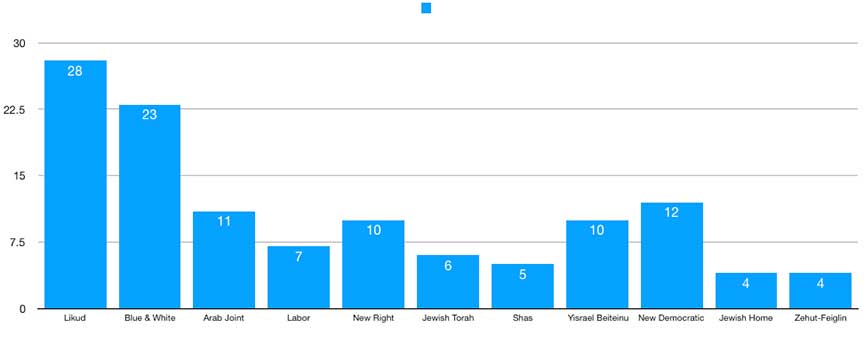
July 6
It would be hard to say that Knesset election 2019, take 2, is in full swing. Much of what happened this week, politically, took place in the shadow of the shooting of an Ethiopian youth and the subsequent large-scale, angry protests that erupted in response. (I will write about happenings regarding the Ethiopian community separately.)
On the heels of the upcoming election, the leadership of both the Labor and Meretz parties have changed hands. In the Meretz party, Nitzan Hurwitz replaced Tamar Zandberg. While Hurwitz is indeed popular, his election was more of a vote against Zandberg — whom it was widely felt ran a failed campaign in April; a campaign to which she, herself, was much too central.
The Labor party made a generational vote. Instead of selecting one of the two young, most dynamic leaders, the party has chosen to return, former Labor Chairman MK Amir Peretz to head the party. Peretz is convinced he can get votes from the Likud in the outlying communities. Speaking to one of his supporters on the day of the vote, he admitted Peretz wouldn't get votes in Tel Aviv, but was poised to get many more votes in other places.
In my humble opinion, choosing Peretz was a huge mistake. One of the problems encountered by the Center-Left in the last election was the lower voter turnout in Tel Aviv, compared to other parts of the country. Stav Shafir could get out that vote. Amir Peretz will not. Of course, in the Left-of-Center, the big question remain what mergers, (if any), ultimately take place before the election — e.g. who will be willing to join up with Ehud Barak's new party? On Saturday night Barak unveiled the name of the party-Democratic Israel.

The latest Channel 13 News polls show a somewhat different picture than the predictions of the last results (released last week). In this latest poll, the Right-wing would earn a majority with Avigdor Lieberman, who continues to make clear he will not enter a coalition with the religious parties. It is hard to know how seriously to take any polls at the moment. The two significant differences between this poll and the initial poll, (one a week earlier) was a drop from 12 to 9 for the Joint Arab List, and a surge for Feiglin’s party, appears to bring the party over the minimum threshold.
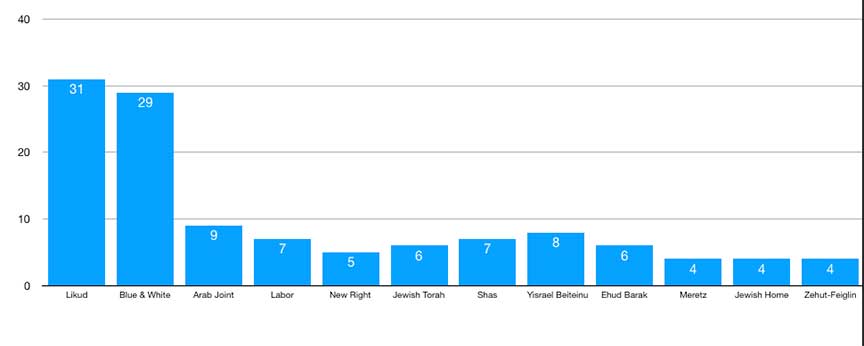
June 16, 2018
It has been a while since I have written an Israeli election update — for the simple reason —very little was happening. That changed dramatically during the last 24 hours. The shift began a few days ago, with rumors about the possible cancellation of the upcoming election. You can read all about that in the second part of what will be in my Newsweek article scheduled to appear tomorrow, which you can preview on our site
The call to cancel the election came from Netanyahu, and no one was sure why … until tonight. Tonight, Channel 13 published a poll which showed that — for the first time in over a decade — the Left-Center bloc would have a majority of 61 seats in the next election. Moreover, the accounting in favor of the Left-Center bloc did not include votes for Avigdor Lieberman’s Yisrael Beiteinu party, which received 7 seats in that same poll.
The other development today, was the official return of Ehud Barak to the Israeli political scene. I attended his opening press conference, and is no question that Barak and the three partners who joined him (including recently released deputy IDF Chief of Staff Yair Golan) gave the most potent presentation for why Netanyahu must go.
Barak is not loved by many. However, I must say that both tonight, and when I sat with him for an interview four months ago, he comes across as the strongest candidate. He is 78 years old, but definitively seems at least a ten years younger than either Bernie Sander of Joe Biden. I guess if they had been one of their country's leading commando in their youth, they might also be in better shape at their collectively ripe old ages.
The new poll tonight, mentioned above, which was conducted before Barak announced the launch of his new, as of yet unnamed, party — which was already hypothetically poised to receive six Knesset seats. Barak's goal is clearly to combine with Labor, and perhaps Meretz. Although with tonight poll, which showed Meretz garnering six seats, a merger might not be necessary. In summary, this has shaped up to be an all-new race and anything can happen.
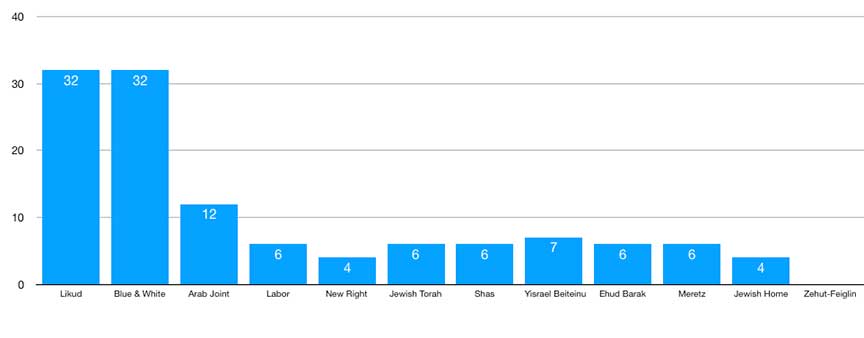
Who would have thought there would have been a part-two to the 2019 Election Blog? But here we are — a complete do-over. You can learn how we got here, from my explanation of the events of the night of May 29th, which appeared in my Newsweek article. However, now, that’s ancient history and the question is — Are we heading into a total replay of the last election? The answer is — its too early to tell. Many of the players will be the same, but there are many unknown variables.
Here are a few:
Now that Kachlon is part of the Likud, will the votes he received in the last election all go to the Likud? My initial sense is — No.
What will happen to the Labor party? We know for sure that Avi Gabbay will be ousted and a new head will be chosen. At this time, Amir Peretz is the only one who has said he plans to run. Itzik Shmuli and Stav Shafir have not yet stated whether or not they will run. Amir Peretz joins a long list of politicians, both in Israel and in the US, who in my opinion, do not know when to retire. Of course, whether the Labor party runs at all is a significant question. The only hope for the Labor is if the young generation takes control. But then, the question becomes why shouldn’t Labor merge with Meretz, who has clearly indicated their desire to run together. The Blue & White party does not wish to have any part of the Labor Party, considering it an electoral liability. This is probably the end of the line for the party that founded the state.
As to Blue & White, they made their first mistake tonight, stating they will continue their agreement to have a rotation between Gantz and Lapid in the top spot. This decision will likely cost them votes — But as is the case with all politicians, ego counts too much.
As to the right-wing, they have spent a few days carrying out a circular fire squad. Of course, the most ammunition was set off between the Likud and Lieberman Party — Each blaming the other for the failure to form a government. Netanyahu started off immediately, Wednesday night, by stating that Lieberman was no longer a right-winger, but a leftist. The next day Lieberman laughed and asked how the person who lives in Ceasaria (i.e., Netanyahu) feels justified calling the person lives in the West Bank settlement of Nokidim (Lieberman) a “leftist”. It has been downhill from there. Lieberman is going to run a campaign declaring that Netanyahu has sold out to the ultra-Orthodox, and that he is the real right-wing, and true champion of the secular.
Today, Netanyahu opened another front, firing both Naftali Bennett from his position as Education Minister and Ayelet Shaked from her position as Justice Minister. Netanyahu claimed that since Bennett and Shaked had not been re-elected in the last election, they did no longer had the support of the public. Whether you agree or disagree with either of their policies, by all accounts, Bennett and Shaked were by far the most efficient of the all the ministers in the current government. In their places, Netanyahu is likely to appoint two present Likud MKs to those job for a few months, good government be damned.
Netanyahu’s expected coalition partners from the Jewish Home Party are demanding those newly vacant posts. However, Netanyahu has indicated he will not give those positions to MKs from another party at this time. MK Bezalel Smotrich, from the Jewish Home Party (who has been demanding the Ministry of Justice post) said at an event at Mercaz Harav, Sunday night, that he wanted the Ministry of Justice “to bring a Justice system based on the Torah to Israel.”
One more question that is open is whether Bennet and Shaked’s “New Right Party” will run again. Shaked had hoped to join the Likud. Although it was reported today that Sara Netanyahu vetoed that possibility. While, as of tonight, Bennett indicated the pair was probably going to run together again, Shaked said she still needed a few days to think about it. She went on to say it had to be God that brought about a second 2019 election.

Blue and White Leaders
The First Election
About this Section- by Marc Schulman
This is part two of the Israeli Elections of 2019. Israel and specifically Prime Minister Netanyahu has called a redo. All that happened in version 1 in the previous page are relevant, but it is a new election and as such things may turn out very differently, or maybe not.
This overall website started with a section on American Presidential elections — a subject that I have written about extensively and on which I have authored a book (“A History of American Presidential Elections: From George Washington to Barack Obama"). I have closely observed/participated in Israeli politics since 1975. In 1977 I voted in Israel for the first time, choosing the party that promised change, “Shinui”. I was in uniform the first time I voted, as I was the second time (while doing reserve duty), when I was probably one of the few people at that point to ever vote from outside Israel, as I was stationed on the Egyptian side of the border during the disengagement. Since then I received an academic understanding of Israeli politics, having been a student of the late Asher Arian, considered the dean of experts on Israeli elections. For the past more than seven years, I have once again had the chance to observe Israeli politics close-up, after returning to Israel following an absence. For the last five years, I have published a column in Newsweek called “Tel Aviv Diary”, which has given me closer access to people and events. Over the course of the coming months, I hope to chronicle and analyze the significant milestones and turning points in this year's Israeli elections, here on these pages. Some of these decisive junctures will find their way to Newsweek, and others will appear in our new Israel economic app, called DigitOne. Some of it may appear in our new economic news site DigitOne.News
 >
>